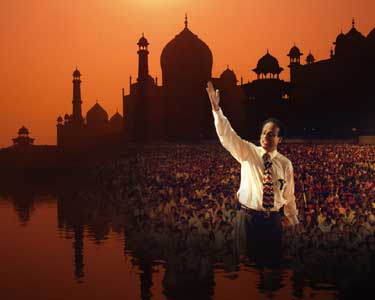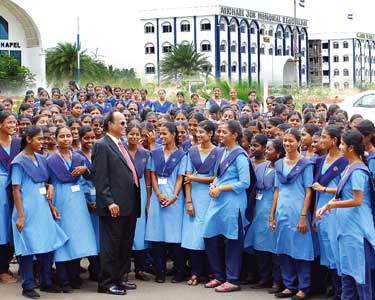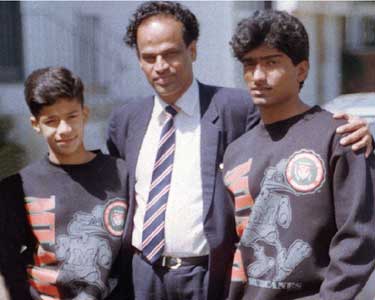Saving India’s Daughters
 P.P. Job paid a high price for preaching the gospel when his two sons were martyred. But Today his adopted daughters-504 in all-are a legacy of his faith in Christ.
P.P. Job paid a high price for preaching the gospel when his two sons were martyred. But Today his adopted daughters-504 in all-are a legacy of his faith in Christ.
“Girls are not wanted in India.” The Rev. P.P. Job says this as a matter of fact, without a hint of irony in his weathered brown face, and then rattles off a string of statistics to prove his point. Each year, he says, 5 million baby girls are aborted in government hospitals; last year 25,000 married women were burned alive; every day 1,200 girls go missing, likely unaccounted victims of domestic abuse.
United Nations reports support Job’s claims, as they reluctantly acknowledge the persistence of female infanticide and gender inequality in India even as the nation becomes an economic success story. “When a boy is born there is a dance,” says Job, a longtime evangelist and leader with the religious liberty advocacy organization Voice of the Martyrs (VOM). “A girl is born—it is like a death. Everyone will be weeping and crying.”
 It is precisely because of such realities that Job’s face brightens up as he cites yet another figure: 504. That’s the number of abandoned girls he calls his daughters, children who were buried alive as newborns or left to die when their parents were martyred for their faith. Job’s center for girls, housed on 60 acres in Coimbatore, a city in the southern Indian state of Tamil Nadu, includes a school and two colleges that educate hundreds of young women. Earlier this year, it inaugurated an electronic library.
It is precisely because of such realities that Job’s face brightens up as he cites yet another figure: 504. That’s the number of abandoned girls he calls his daughters, children who were buried alive as newborns or left to die when their parents were martyred for their faith. Job’s center for girls, housed on 60 acres in Coimbatore, a city in the southern Indian state of Tamil Nadu, includes a school and two colleges that educate hundreds of young women. Earlier this year, it inaugurated an electronic library.
Yet advocating for India’s daughters was once hardly on Job’s radar. He spent more than 30 years preaching around the world and assisting persecuted Christians. In India he spoke out against the government’s failure to protect religious minorities in the predominantly Hindu nation. But after his youngest son, Michael, was martyred in 1999, he says God gave him a burden to help India’s unwanted girls. The martyrdom of his other son, John, eight years later only deepened his resolve. He says God told him, “I will give you many daughters in place of your sons.”
Now through his Michael Job Center, the evangelist is raising up a generation of girls who may follow in his footsteps, going around the world with a college degree in one hand and a Bible in the other, sharing the gospel. “Like [the apostle] Paul, a tentmaker, they will make their own money by hard work, and they will preach the gospel,” he says. “I always think: If I educate one boy I educate only one man. But If I educate one girl, I educate one family and the next generation, and they will make another generation. So we will be preaching the gospel to the next generation because of girls.”
504 and Counting
Described as “the Billy Graham of India,” Job has ministered in 129 nations since 1963 and spent more than 33 years as an advocate with VOM. Job, who considers VOM founder Richard Wurmbrand his mentor, worked primarily in the former Soviet Union and the Muslim world before becoming president in 1997 of International Christian Association, a missions network that includes VOM, where he served until 2002.
 “I traveled all over the world, 28 nations in Africa, many countries in east Europe, because African people and east European people under communism never thought a preacher will come from a Hindu nation,” Job says. “But because of that, I had no problem entering the communist world to help the people and to take the Bibles to that place.”
“I traveled all over the world, 28 nations in Africa, many countries in east Europe, because African people and east European people under communism never thought a preacher will come from a Hindu nation,” Job says. “But because of that, I had no problem entering the communist world to help the people and to take the Bibles to that place.”
In his native India, Job was also a strident advocate for religious freedom, often criticizing the Indian government for not protecting religious minorities. In December 1998, after he spoke at a rally in front of the Indian Parliament to protest the recent deaths of several Christians, militant Hindus sent him threatening calls and letters, telling him to stop preaching against persecution or his family would be wiped out.
It was a time of heightened persecution in India. The following month, in January 1999, Hindu radicals burned missionary Graham Staines and his young sons alive in their automobile in Orissa state. The following September, another Christian leader, Father Arul Doss, was shot to death with arrows as he fled his burning church in Orissa. Also that year, in the neighboring state of Andhra Pradesh, another prominent minister, the Rev. Botla Ratnam, was stabbed to death.
Job himself was struck in the head by shattering glass when Hindu militants stoned his car. But a worse blow was to come. While he was recovering from his wounds, he received a call that his youngest son, Michael, a 21-year-old medical student, had been critically injured in a hit-and-run accident. Michael Job died the following week.
“They tried to kill me,” Job says. “Finally they were successful to kill my son Michael.”
He believed continuing in ministry would be a testament to God’s grace in the midst of sorrow and tragedy, so Job determined to keep preaching. “Though my son’s killers wanted to stop me from preaching the Word of God, the opposite happened,” he writes in his book Turn Your Sorrow. “I began preaching the Word of God with renewed vigor because I had already faced the ultimate test of faith in my son’s death.”
But Job also began to feel he should do something to help others. “Then I found out girls are not wanted in India because of the dowry system,” he says.
Although India passed the Anti-Dowry Act in 1961, making it illegal for a groom or his family to demand dowry payments, thousands of women are killed each year by their husbands or in-laws because of inadequate dowry payments. In a practice known as “bride burning,” husbands douse their wives with kerosene and set them on fire if they don’t deliver on higher dowry payments.
The dowry system also has given rise to sex-selective abortion, though the practice is officially illegal. Among families who don’t have access to ultrasounds, newborn girls too often are left to die.
When Job founded the Michael Job Center just months after his son’s death, he took in 31 girls who had been orphaned or abandoned. “I took only 31, but it was very difficult,” he says, pointing to the financial and logistical difficulty he initially faced. “I had two boys. It was very difficult to bring them up. So my wife says, “˜How can you bring 31?’ But slowly, slowly it was increased.”
He launched a school for girls in 2003 and the following year founded two colleges that specialize in education and arts and sciences. Today some 700 young women attend the colleges, which are affiliated with the Tamil Nadu Teachers Education University and Bharathiar University, and the students have been noted for their academic achievement. Job’s wife, Dr. Mary Job, a gynecologist who once worked at a hospital run by Mother Teresa, also helps provide specialized maternity care for poor, uneducated women through a clinic at the center.
But in 2007, the year both colleges began offering graduate-level courses, tragedy struck again. Job’s oldest son, John, had moved to Dubai, where he operated a computer business as a cover for an underground Christian printing press. He distributed Bibles throughout Saudi Arabia, Yemen and other nations officially closed to Christian evangelism, and untold thousands had been reached with the gospel. But Jobs says, “Unfortunately, I got a dead body from Dubai.”
Job says his son’s murder by radical Muslims made him want to do even more to help girls in need. “We cannot sit there and cry,” he says. “When they are gone, they are gone. They will not come back. Only we can go there. So I thought, God is giving me an opportunity to surrender full time, 100 percent, for these girls. So I told God, “˜If You give me a chance, I will adopt 1,000 girls.'”
The numbers grew rapidly in 2008, when Hindu radicals killed dozens of Christians in Orissa state and forced some 24,000 to flee into the jungles. Job took in 200 girls from Orissa state alone whose parents had been murdered or displaced in the violence. “Suddenly, they came like a wild wind,” he says.
With support from donors worldwide and a staff of 128, Job now cares for 504 girls from 22 Indian states and neighboring nations such as Nepal, Bhutan, Burma, China and Tibet. Some are the children of martyred Christians. Others have parents ministering in places too dangerous for their daughters. Many of the girls have survived horrific circumstances.
As a newborn, Amy was buried alive behind a factory. Because her head peeked out from the ground, an elderly man heard her crying. “He took his torchlight and went behind the factory, and saw this girl,” Job says. “He pulled the girl out, and she’s in our orphanage now.” Job named the child Amy Carmichael after the 20th century British missionary to India.
There’s a Corrie ten Boom at Job’s center too, and a Naomi, an Esther and a Shekinah. He named one girl Lois, after Timothy’s grandmother in 2 Timothy. She was found between the bodies of her father and mother the morning after Hindu radicals murdered them and other Christians. “They spared her because she’s a girl nobody wants,” Job says. “You kill a girl in the Hindu religion, you’ll be born as a girl. So usually they don’t kill girls.”
A local pastor brought her to Job’s orphanage, but initially she wouldn’t speak. “She was afraid,” Job says. “She had seen the dead bodies, the killing.”
When an elderly volunteer from Norway visited the orphanage on a missions outreach, Job assigned the woman to be Lois’ roommate. She got Lois to smile and talk as she showed the little girl picture books telling the story of Jesus.
“She was showing these pictures, photographs, books, pages after pages, telling the story to our Lois,” Job recalls. “And Lois says, “˜Mama, this man in the picture came to my home when my parents were killed and told me: “Don’t cry, Lois. I will take you to a good place where you will have good food, good rest, good education.” ‘ That is my Michael Job Center.”
Girls like Lois will one day become change agents in India, says Cindy Collins, global outreach director for Operation Outcry, a ministry that reaches out to women who have been hurt by abortion. “[The center] is a place of preparation for these young women that have been rescued out of death, out of seeing their parents martyred, out of abandonment, out of being buried alive,” says Collins, who has volunteered at Job’s center three times in the last two years, most recently in June. “It is a place of preparation and destiny for these women to bring change in their nation.”
“˜He Holds My Hands”
Despite officially having religious freedom, India remains a dangerous place to be a Christian. In 2009 there were more than 152 attacks on Christians, according to the Evangelical Fellowship of India. And though the government espouses religious tolerance, the U.S. Commission on International Religious Freedom placed India on its watch list again this year because of ongoing communal violence and a largely inadequate government response.
Much of the violence is politically motivated, with Hindu nationalist political parties seeking both religious and political dominance. Five states, including Orissa, have passed anti-conversion laws, which have led to dozens of arrests this year.
Because all the world’s major religions are represented in India””the nation has a Hindu majority and one of the world’s largest Muslim populations””Job says evangelism is fiercely competitive.
“We have to fight for our existence when we say we are Christians,” Job says. “When you say Christianity is the only way to heaven, people will kill you.”
But suffering isn’t something Christians should shy away from, the evangelist claims. “It is by suffering that one learns to surrender to the Lord,” he writes in Turn Your Sorrow. “Therefore, suffering is a means of coming closer to God.”
That is how his faith survived his sons’ deaths, how he continued working in ministry despite his loss. He says God held his hand.
“When my sons were killed, I got the strength from above,” he says. “Jesus is holding our hands. That is called grace.
“It is not only Paul’s experience in the darkness of life. … It is also my personal experience that He holds my hands,” Job adds. “It is not easy, but I have experienced that power, that grace, in the midst of darkness.”
Six months after Michael’s murder, Job told his wife that they wouldn’t understand why God allowed their son to die until they reached heaven. But he’s changed his mind.
“Now I can tell her [504] children are living, they have life, they have education, they have a hope, they have a future,” he says. “So now I have an answer on this earth before I reach heaven.
“So you don’t need to wait to be in heaven to know. This is the kingdom on earth.




























































